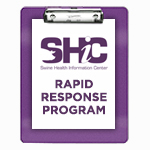Rapid Response Program Investigates PEDV and Refines Processes

Reports of porcine epidemic diarrhea virus (PEDV) recently triggered a request for the Swine Health Information Center (SHIC) Rapid Response Program to help identify pathways of PEDV introduction on affected farms. SHIC initiated a response to test the program as well as provide assistance to affected producers, identifying high risk events resulting in the outbreaks.
Following the Rapid Response Team’s investigation into the PEDV affected farms, the National Pork Board (NPB) organized an interactive review of the investigations with the participating veterinarians to examine outbreak reports with outcomes and action items identified.
SHIC’s goal for testing the program includes exercising the system for future emerging or foreign animal disease response needs, learning what went well, identifying what can be done better, and discovering what work needs to be done to continue to support the process. During the NPB review, participants shared their observations about results of the farms’ investigations and the Rapid Response Team process. This SHIC-NPB collaboration helped to further develop the overall goal of building and maintaining industry preparedness in the event of an emerging or foreign animal disease outbreak.
The NPB executive summary of the review contains details on the investigation results. Risk events were subjectively assigned a risk level of low, medium or high likelihood for PEDV introduction by each investigation team. Risk events rated high most often included dead removal, weaned pig removal, cull sows and feed delivery. Areas of concern from the affected farms were listed along with recommendations for preventing further outbreaks.
Since November 25, 2017, there have been 10 Rapid Response Program investigations focusing on PEDV outbreaks on farms. Current PEDV outbreaks spanned from February 9, 2018, to March 6, 2018. All of the investigations occurred in commercial sow herds.








